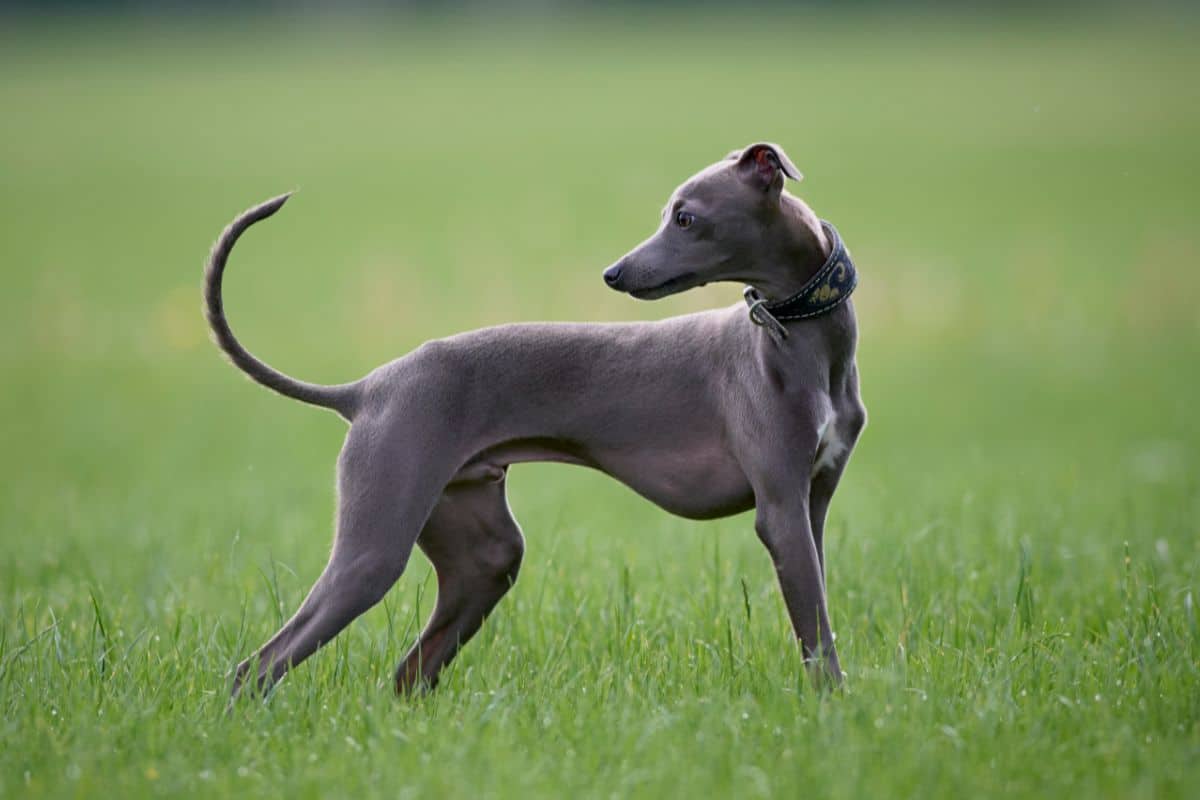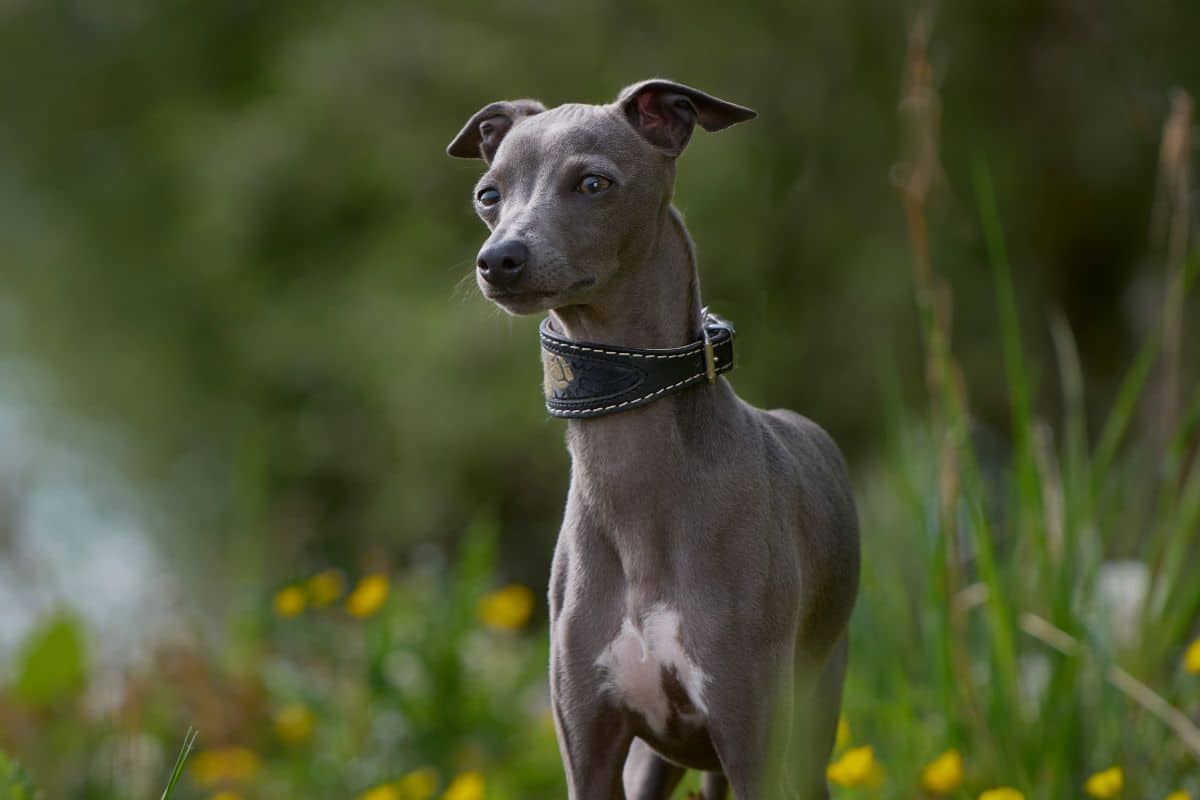Just about everyone who’s heard of whippets has heard of blue whippets – they are hands down THE most popular breed of whippet out there.
Which is not so surprising, given their stunning athletic aesthetic and beautiful coat colour with the distinctive hue that earned them their name.
But unfortunately, they can be rather rare indeed, and as such they tend to come complete with a very high asking price if you buy one as a pup, especially if they come from a good, well established breeder.
In this article, we’re going to give you the complete lowdown on blue whippets, starting with the basics, explaining why they’re so rare, and of course, answering all of your most frequently asked questions on the subject.
And without further ado, let’s get straight to it!
What Exactly Is A Blue Whippet, Anyway?
A blue Whippet is basically a whippet with a coat that looks like a washed-out black with a gunmetal grey colour that’s a kind of bluish-grey.
A blue whippet has a lot in common with regular whippets. They are bred by crossing the breeds of greyhounds and terriers.
But, as their name suggests, there is a stark, definitive difference between a blue whippet and a regular one. And you’ve guessed it – it’s the colour!
Interestingly, however, a blue whippet isn’t actually blue at all (except for the nose). But whereas most whippets are usually brown, black, fawn, or white in colour, blue whippets have a coat colour that’s a distinctive bluish-grey, also known as gunmetal grey.
How Come Blue Whippets Are So Rare?

In order for a whippet puppy to be a blue whippet, it needs to inherit the dilute gene from both biological parents, and there’s only a 25% chance that this will happen, even if both parents are carriers of that gene.
Are you ready for some science? Don’t worry, we promise to keep it simple!
It’s all about genetics, and the genes that a puppy will inherit from its biological parents. To be a blue whippet, the whippet puppy would have to inherit one dilute gene, determining its coat colour, from both of its parents.
A blue whippet does not have to have two blue whippet parents. But it does need to have both parents carrying at least one dilute gene each.
A whippet may be a carrier of the dilute gene without actually being a blue whippet. This is because the dilute gene is what is known as a recessive gene, and if an animal has at least one dominant gene, then the dominant gene succeeds over the recessive gene.
When a whippet puppy is conceived, it inherits genes relating to its coat’s appearance from both parents. For a blue whippet to be born, both parents have to have at least one dilute gene.
If each parent has one dilute gene and one non-dilute gene, then this means that each parent gives a 50/50 chance of passing their dilute gene on.
(Don’t worry, we’ll do the maths.) This means that in this instance, the puppy has just a 25% chance of getting two dilute genes, which would be necessary for producing a blue whippet.
Do Blue Whippets Tend To Get Genetic Health Conditions?
As a general rule, blue whippets are no less healthy than any other whippet. That said, there is the slight possibility that they can inherit Colour Dilution Alopecia (CDA). (More on that shortly.)
I can guess what you may be thinking now. If a blue whippet has such specific genetics, does that mean that it is predisposed to known genetically inherited conditions.
Well, I’m very pleased to report that it’s mostly good news from me! Blue whippets generally tend to be just as healthy as their non-blue counterparts. But there are exceptions to this rule…
There is a slight possibility that blue whippets can inherit a genetic condition known as colour dilution alopecia, which is usually just referred to as CDA for short.
But as I say, on the whole it’s good news.
What Is Colour Dilution Alopecia (CDA)?
CDA is basically a genetically inherited condition that can affect any dog that has inherited two dilute genes from its parents, (and this includes blue whippets), that can cause patches of hair thinning or loss and potentially also flaky and/or itchy skin.
You may not notice the signs of this condition at first, because they tend to develop over time. It predominantly affects the dog’s skin, coat and fur, and the most common symptoms are as follows (listed in no particular order):
- Itchy patches
- Hair loss
- Dry and flaky skin
- Blisters and pimples
- Broken, stubbly hairs
- Infected hair follicles
Frequently Asked Questions
What 2 Breeds Make A Whippet?
Whippets, including blue whippets, are bred from greyhounds and terriers.
Whippets (blue ones and regular ones) are a hound breed that has been bred only as recently as the 19th century. They were developed as a cross of greyhounds and terriers. Initially only small English greyhounds were used, but now Italian greyhounds are used too, in order to provide an even sleeker aesthetic.
Do Whippets Come In Blue?
Technically, blue whippets aren’t actually blue, they’re more of a washed out black, producing a gunmetal grey effect.
We mentioned this earlier, but it bears repeating here. Blue whippets, despite their name, aren’t actually blue, as in the colour of the sky. Rather, it’s actually more of a gunmetal grey. Kinda a washed out black.
Are Whippets Good Pets?
Whippets, including blue whippets, make excellent pets. They are gentle and relatively quiet.
Whippets are lovely pets. They are often gentle, quiet, and tolerant. They can also be competitive when running around, and at times highly strung, but don’t let this put you off, they are easy to parent.
Wrap Up
I hope this article has taught you something you didn’t already know about blue whippets. Especially if your family has been thinking of getting one.
If you’d like to learn more, stick around for the FAQ section coming up next!





